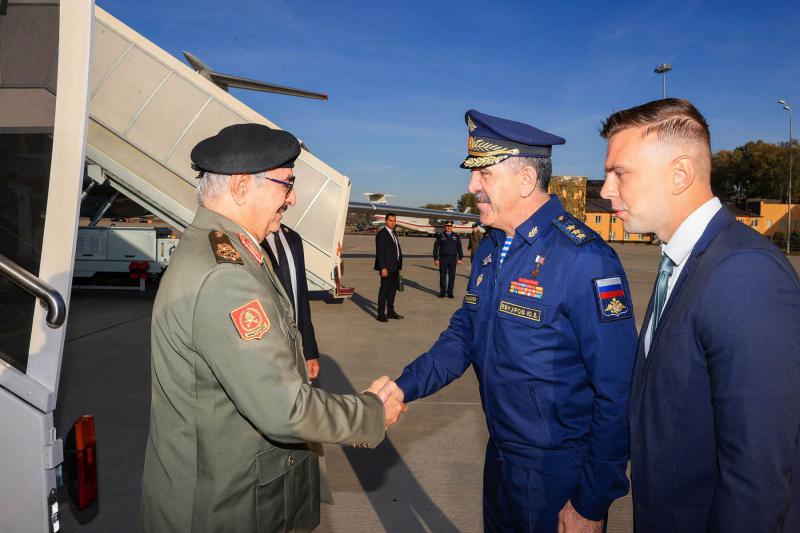BENGHAZI –
The British newspaper the Daily Express warned that continued Western dealings with the commander of the Libyan National Army (LNA) in eastern Libya, Field Marshal Khalifa Haftar, threaten to obstruct European efforts aimed at curbing a growing Russian influence in Libya.
The paper also warned that Europe may foot the bill for the expansion of Russia in Libya, as this could provide an opportunity for Moscow to invest in the migration card and use it to put pressure on European powers.
The British newspaper’s warnings came days after the UK ambassador to Libya attended a military parade of forces affiliated with the General Command of the LNA in the city of Benghazi alongside Haftar, who has become heavily-dependent on Russian military support to maintain his authority. It also indicated the presence of a significant number of Russian military, including 1,500 regular troops, who recently arrived in eastern Libya.
Warnings are coming from more than one side. The European border agency Frontex had previously cautioned that Russia’s tendency to transport migrants to Europe’s doorstep, whether along Russia’s eastern borders or through agents in Africa, poses a major threat to security.
The Daily Express report indicated that Western diplomats are trying to court Haftar by offering concessions and economic incentives in exchange for his pledge to curb the flow of irregular migrants.
In the face of growing Russian influence, the United States and the European Union have tried over the past two years to win over Haftar. There were successive visits by European officials to Benghazi. On two recent occasions, Italian Prime Minister Giorgia Meloni also offered economic and security contracts and deals in exchange for Haftar’s pledge to cooperate in stopping the flow of migrants towards Europe.
Last week, Martin Andrew, the British ambassador to Libya, met the Libyan army commander in Benghazi to push the view that all parties must participate in the UN political process.
Talks about Russian influence in Libya and Moscow’s desire to expand in Africa in general, are at the forefront of observers’ and analysts’ talk, especially with the mounting European concerns over the impact of such an expansion could have on their interests, while others have warned of the seriousness of the situation.
According to the Daily Express report, the Russian presence in Libya enabled Moscow to get five billion euros, in addition to more than 2.5 billion euros in smuggled gold. Russia also gained control over a diamond mine worth one billion euros in the Central African Republic, with net revenues annual of 300 million euros.
Fears are also growing over Russian expansion in Libya in the west of the country. The religious leadership in the Dar Al-Iftaa had previously stated that it was monitoring the arrival of Russian forces and weapons, in preparation for the deployment of an “Africa Corps” across Libya and other neighbouring countries. It said that what it called “jihad” against these forces “is a legal duty that falls upon the shoulders of the people of Libya,” adding in a statement, that the Russian military presence on Libyan territory constitutes a form of occupation and invasion.
In recent days, local Libyan media published footage indicating the arrival of a fifth batch of Russian troops at the Hariga port in the city of Tobruk in the far east of Libya, along with,over 45 days, military equipment, including weapons, ammunition and military trucks to establish the Russian African Legion.


